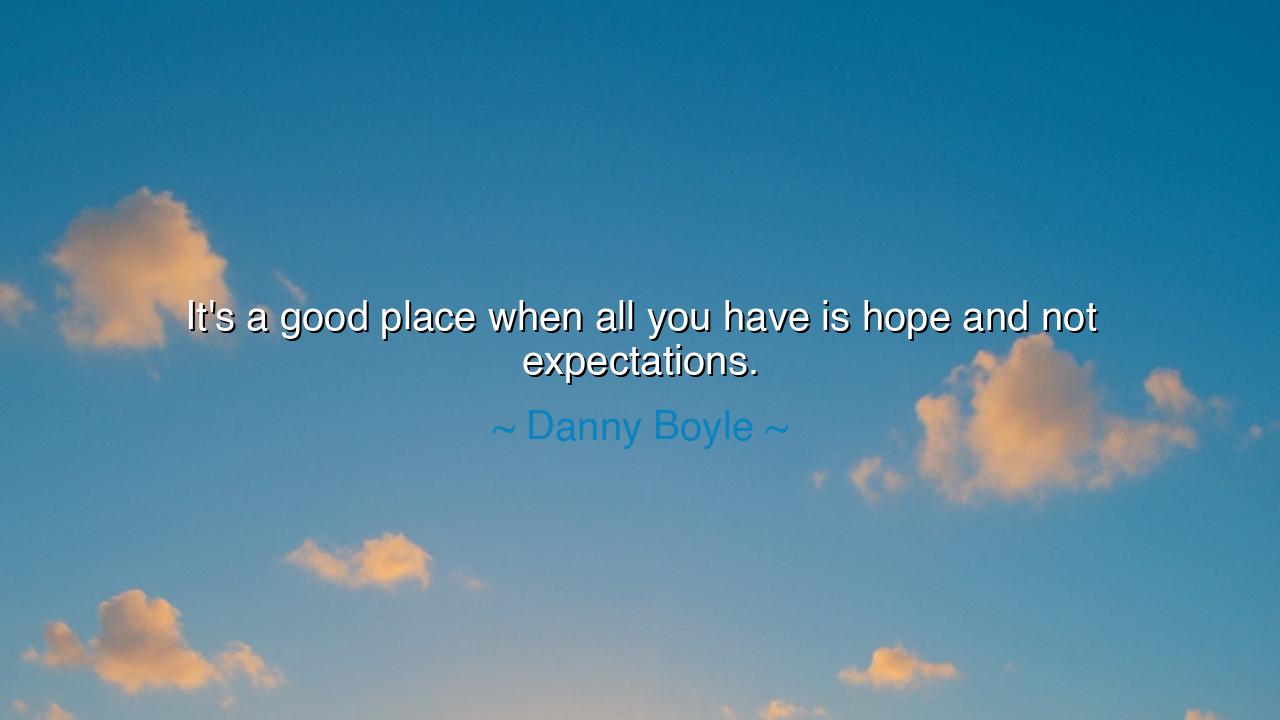
It's a good place when all you have is hope and not expectations.






The words of Danny Boyle—“It’s a good place when all you have is hope and not expectations”—speak to one of the oldest and deepest truths of the human spirit: that peace is found not in control, but in surrender. Boyle, a filmmaker known for stories of struggle and transcendence, reminds us here that there is a sacred state of being—a quiet strength—that arises when we release our demands upon life. To live with hope rather than expectation is to live with openness rather than attachment, with faith rather than entitlement. It is a wisdom that echoes through time, from the stoics of ancient Greece to the mystics of the East, and it teaches us the most humbling and liberating truth of all: that we do not own the outcome, only the effort.
To understand his meaning, we must first distinguish between hope and expectation. Expectation is born of the ego—it demands, it calculates, it clings to a vision of how things must unfold. It says, “I have earned this; therefore, it must be so.” But hope is born of the soul—it trusts without possession, it believes without condition. Expectation closes the heart when it is disappointed; hope keeps it open even in sorrow. Boyle calls the state of pure hope “a good place” because it is a place of freedom, where one can act, dream, and strive without fear of loss. It is the still center amid the chaos of ambition.
In his films, Boyle often celebrates those who live on the edge of despair yet refuse to surrender their inner light. Slumdog Millionaire, the story of a boy who rises from the slums of Mumbai to triumph against all odds, is itself a hymn to this philosophy. The hero, Jamal, does not expect to win; he only hopes to find his lost love. His hope carries him through hardship, while the expectations of others—greed, cynicism, doubt—lead them to ruin. This is Boyle’s vision of grace: that the one who hopes purely, without entitlement, becomes the instrument of destiny itself.
History, too, bears witness to this truth. Consider Mahatma Gandhi, who faced an empire with no army, no wealth, no certainty of victory. He did not expect to see freedom in his lifetime, but he hoped for it with all his heart. His hope, uncluttered by demand, gave birth to a movement that transformed a nation. Those who lived by expectation grew impatient and bitter; Gandhi, guided by hope, endured, and through endurance, prevailed. The same could be said of Nelson Mandela, who survived twenty-seven years in prison not because he expected liberation, but because he hoped—steadily, humbly—that justice would one day awaken. Such men prove that hope is the root of resilience, and that expectation, when held too tightly, becomes a chain upon the soul.
Boyle’s words also carry a quieter, more personal wisdom. To live with expectation is to live in constant comparison—with others, with time, with oneself. It breeds restlessness and disappointment, for life rarely moves according to our design. But hope asks nothing more than the chance to keep going. It nourishes the weary heart like cool water, asking for no proof, only faith. The one who hopes can rise after failure; the one who expects is broken by it. Thus, when Boyle says it is a “good place” to have only hope, he means that it is the place where peace and perseverance dwell together.
The ancients knew this well. The philosopher Epictetus taught that serenity comes when we “desire nothing outside our own control.” Hope, in this sense, belongs to the eternal and inner; expectation belongs to the fleeting and external. When we release our grip on what we cannot command, we make space for grace to enter. Life may not give us what we imagined, but it will give us what we need. And in that exchange—of control for acceptance, of demand for wonder—we rediscover our strength.
Let this, then, be the teaching for those who seek wisdom: hold hope lightly, and release expectation completely. Strive, but do not cling; dream, but do not demand. When life disappoints you, let it teach you patience; when it surprises you, let it teach you gratitude. Each day, hope anew—not for what you desire, but for the strength to meet what comes. This is not passivity, but courage; not resignation, but trust.
For as Danny Boyle reminds us, it is a good place when all you have is hope. It is the place where the heart is alive, unburdened by judgment, ready to receive both joy and sorrow as gifts of the same mysterious source. To live there is to walk with quiet confidence through the unknown—to act without fear, to love without demand, and to trust that whatever happens, life itself will unfold as it must. In that space of humble hope, we find not only peace—but the boundless freedom of the soul.






AAdministratorAdministrator
Welcome, honored guests. Please leave a comment, we will respond soon